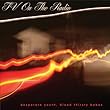 By Daniel Garrett
By Daniel Garrett
TV on the Radio
Desperate Youth, Blood Thirsty Babes
Touch and Go Records, 2004
Many people are now talking about the Brooklyn band TV on the Radio, a good reason to consider the band’s work: one does not want to miss anything good; and at the same time, it gives a person a chance to hear and see what other people’s tastes are like these days. TV on the Radio’s album Desperate Youth, Blood Thirsty Babes seems a brainy, engaging work, though not what I would think of as having the kind of innovation that gets critics talking and the public buying: then again, as the band’s song “King Eternal” says, “Infinity’s hourglass will measure all.” We are just writing the notorious first draft of history; and “King Eternal” seems a declaration of ambition and warning. “The hour of man is nigh, so gather up all supplies, and stack ‘em up high,” the song continues.
There is the politics of race and exploitation in “The Wrong Way,” with the intersection of personal anger and public need for leadership; and it is this song from which the title of the band’s album comes: “Hey, desperate youth!/ Oh, blood thirsty babes!/ Oh your guns are pointed,/ your guns are pointed the wrong way.” The production of “The Wrong Way,” the first song on the album, seems a bit cloudy—that and the lyrics deliver an uncertain first impression, though the song is clearly some kind of anthem for this ethnically integrated musical group.
“Staring at the Sun,” with a poetry of elemental imagery that touches the surreal, has a sound that calls to memory the more glamorous aspects of David Bowie and the Rolling Stones (I am thinking of the Bowie of “Fame” and “Young Americans” and the Stones of “Miss You” and “Emotional Rescue.”)
We like songs sometimes because of their sound, sometimes because of their message, sometimes because of their sentiment; and the song I find most memorable here is “Dreams,” the third song in the set, with verses delivered like slow chants, and that preference is simply because of the lines “I know your heart can’t grieve/ what your eyes won’t see/ but you were my favorite moment/ of our dead century.”
There are discrete elements of folk, rock, and subtle dance music, and even world music, in the work of TV on the Radio. (I think also of Bobby McFerrin and Nona Hendryx.) It is fascinating that the band has been acclaimed for producing rock music (I sometimes think that whatever certain critics like they call rock music—until they stop liking it). TV on the Radio is comprised of Tunde Adebimpe (voice, loops), Kyp Malone (voice, guitar, loops), and David Sitek (credited for “music”), with the support of drummer Jaleel Bunton, singer Katrina Ford, flutist Martin Perna, and guitarist Nick Zinner. The band’s music is in many ways bare bones. I would not say that its lyric ideas are especially remarkable, or that its exploration of the human psyche is revelatory, or that this is music you can dance to. The band’s experiments with song structure, including abrupt and thorough changes in rhythm, tempo, and vocal lines, are probably its most diverting, most inventive, attribute. The sound is not slick—it seems made mostly by human voices and hands, not machines.
Misguided temptation, that is the refrain of popular music: “I will be your accident if you will be my ambulance,/ and I will be your screech and crash if you will be my crutch and cast,/ and I will be your one more time if you will be my one last chance/ —oh, fall for me,” are some of the amusing, disarming lines in “Ambulance.” However, beyond that acknowledgement of how people use each other, “Poppy” says, “Oh, kid, congratulations./ You held on to your dear, dear, dear identity/ even while spending so much time with me” and “We wake up in the same bed/ but with different bodies./ God bless our separate heads./ Oh, desire will run about.”
The mix of perception and profanity in some of the songs is certainly true to contemporary communication, but I hope for some words that go beyond what we have said already to each other. I am not the only one: “Oh aching bones on sleepless bed,/ they toss and turn and roll away/ from words unsaid,” are lines from “Don’t Love You.” It is sad that the closest we come to revelation sometimes is in acknowledging that there are other things yet to be said. Other times there is nothing more expressed than male lust: as in “Wear You Out,” which says, “Watch a room full of roosters/ turned to cocks runnin’ wild/ scramblin’ like hungry dogs/ towards you, child” and “let’s pursue this argument in darkness,/ curtains drawn, limbs entwined.”
I will have to listen to TV on the Radio’s newest music to ascertain more about its objectives and importance.
About the reviewer: Daniel Garrett has written about music for AllAboutJazz.com, Hyphen, IdentityTheory.com, Option, and PopMatters.com, including commentary on Sade, the Afghan Whigs, Tupac Shakur, Kitchens of Distinction, Matthew Sweet, and Annie Lennox; and his commentaries on Lizz Wright, Leela James, Skye, Morrissey, Sinead O’Connor, B.B. King, Frank Sinatra, and Al Green have appeared on the web pages of The Compulsive Reader. Daniel Garrett has written also about art, books, business, film, and politics, and his work has appeared in The African, American Book Review, Art & Antiques, The Audubon Activist, Cinetext.Philo, Film International, Offscreen, Rain Taxi, The Review of Contemporary Fiction, and World Literature Today.